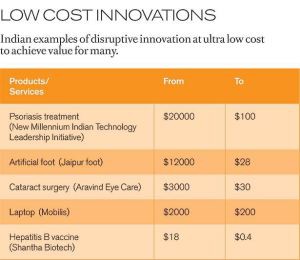Reposting from the Jykes International Blog http://www.jykes.fi/fi/kansainvaelistymaeaen-blogi/2213-is-your-business-making-something-that-people-want
The Time to Frugal Innovate is not now, but yesterday.
By this I mean that the business that now applies the Frugal Innovation process is not the first to do so. It already started:
and so many more examples are there.
source: http://classic.marshall.usc.edu/iom/fi/health.htm
All the above have been commercialized and are not just mere ideas. And no, your product or service that comes out of the Frugal Innovation process is not going to cannibalize your other expensive products. You are just giving the customer something they want and are able to afford. The functions and applications that come with the higher priced product will always have it’s customers but also you are making new customers where they were none before by introducing your Frugal products and services. Of course, the margins with the Frugal products will be less but you can more than make them up with sales volumes.
Let me remind you that frugal innovation is not a code word for cheap. We associate cheap with inferior products and solutions. If manufacturers want to sell cheap and inferior products, no one in India and China will buy your products. So, this is about learning how to innovate under severe constraints and turn adversity into growth opportunities.
Navi Radjou, Jaideep Prabhu and Simone Ahuja in their book Jugaad Innovation (http://jugaadinnovation.com/) put it more nicely:
“It’s hard for Western executives to cultivate this frugal, flexible and inclusive mindset — which we call jugaad — in resource-rich and relatively stable Western economies.”
These businesses need to go to emerging markets and partner with the right local businesses or have a local R&D team to learn new processes or a whole new way of doing things. It takes an entrepreneurial mindset at the management level in businesses to rethink their conservative strategies and pivot to aim for Frugal products and services.
What areas of business can Frugal Innovation be most easily applied?
I would like to identify the following areas:
Finland and Europe must embrace Frugal Innovation. So, is your business ready to take the next step and innovate and make something people want?

